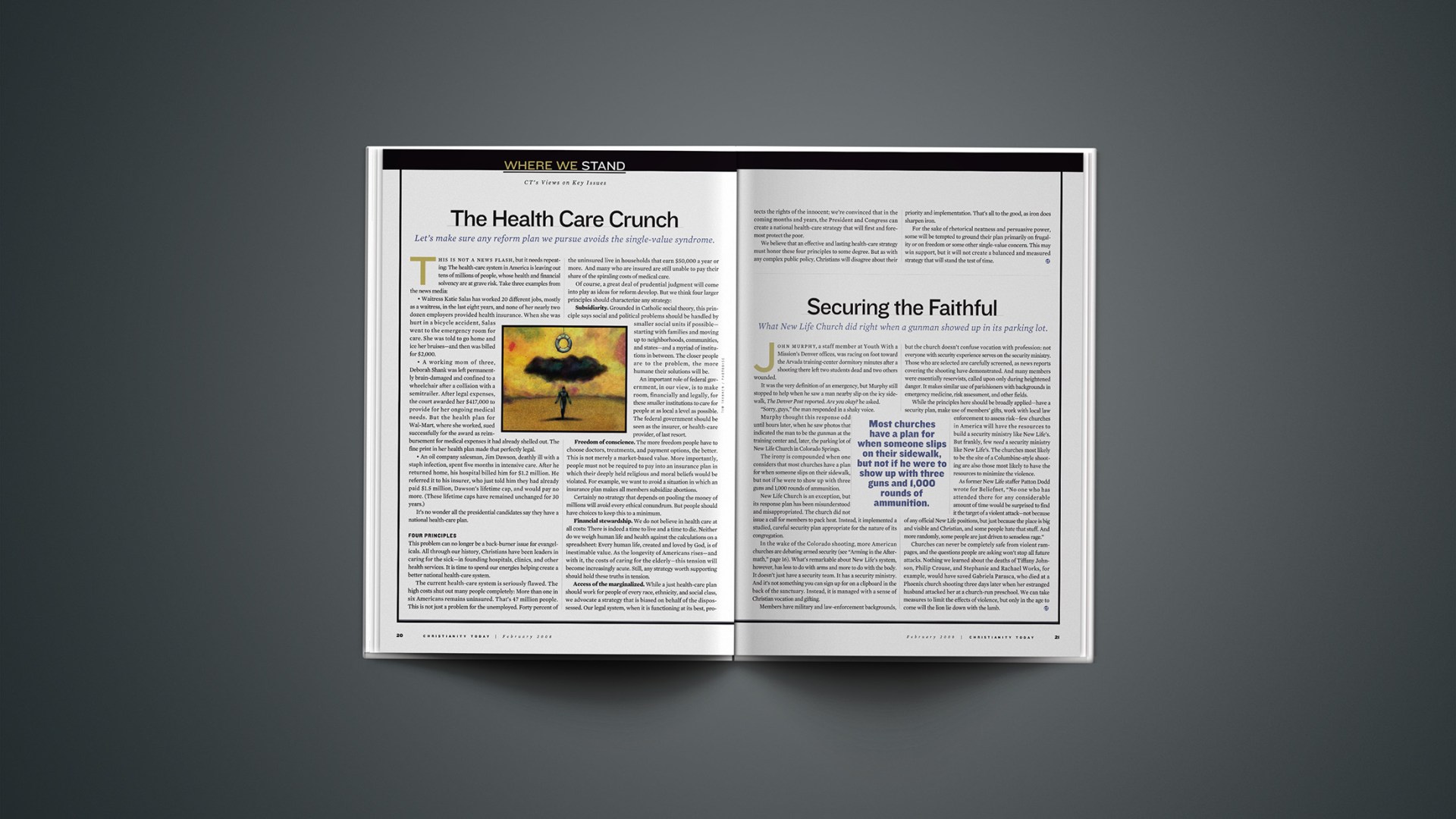This is not a news flash, but it needs repeating: The health-care system in America is leaving out tens of millions of people, whose health and financial solvency are at grave risk. Take three examples from the news media:
• Waitress Katie Salas has worked 20 different jobs, mostly as a waitress, in the last eight years, and none of her nearly two dozen employers provided health insurance. When she was hurt in a bicycle accident, Salas went to the emergency room for care. She was told to go home and ice her bruises—and then was billed for $2,000.
• A working mom of three, Deborah Shank was left permanently brain-damaged and confined to a wheelchair after a collision with a semitrailer. After legal expenses, the court awarded her $417,000 to provide for her ongoing medical needs. But the health plan for Wal-Mart, where she worked, sued successfully for the award as reimbursement for medical expenses it had already shelled out. The fine print in her health plan made that perfectly legal.
• An oil company salesman, Jim Dawson, deathly ill with a staph infection, spent five months in intensive care. After he returned home, his hospital billed him for $1.2 million. He referred it to his insurer, who just told him they had already paid $1.5 million, Dawson’s lifetime cap, and would pay no more. (These lifetime caps have remained unchanged for 30 years.)
It’s no wonder all the presidential candidates say they have a national health-care plan.
Four Principles
This problem can no longer be a back-burner issue for evangelicals. All through our history, Christians have been leaders in caring for the sick—in founding hospitals, clinics, and other health services. It is time to spend our energies helping create a better national health-care system.
The current health-care system is seriously flawed. The high costs shut out many people completely: More than one in six Americans remains uninsured. That’s 47 million people. This is not just a problem for the unemployed. Forty percent of the uninsured live in households that earn $50,000 a year or more. And many who are insured are still unable to pay their share of the spiraling costs of medical care.
Of course, a great deal of prudential judgment will come into play as ideas for reform develop. But we think four larger principles should characterize any strategy:
Subsidiarity. Grounded in Catholic social theory, this principle says social and political problems should be handled by smaller social units if possible—starting with families and moving up to neighborhoods, communities, and states—and a myriad of institutions in between. The closer people are to the problem, the more humane their solutions will be.
An important role of federal government, in our view, is to make room, financially and legally, for these smaller institutions to care for people at as local a level as possible. The federal government should be seen as the insurer, or health-care provider, of last resort.
Freedom of conscience. The more freedom people have to choose doctors, treatments, and payment options, the better. This is not merely a market-based value. More importantly, people must not be required to pay into an insurance plan in which their deeply held religious and moral beliefs would be violated. For example, we want to avoid a situation in which an insurance plan makes all members subsidize abortions.
Certainly no strategy that depends on pooling the money of millions will avoid every ethical conundrum. But people should have choices to keep this to a minimum.
Financial stewardship. We do not believe in health care at all costs: There is indeed a time to live and a time to die. Neither do we weigh human life and health against the calculations on a spreadsheet: Every human life, created and loved by God, is of inestimable value. As the longevity of Americans rises—and with it, the costs of caring for the elderly—this tension will become increasingly acute. Still, any strategy worth supporting should hold these truths in tension.
Access of the marginalized. While a just health-care plan should work for people of every race, ethnicity, and social class, we advocate a strategy that is biased on behalf of the dispossessed. Our legal system, when it is functioning at its best, protects the rights of the innocent; we’re convinced that in the coming months and years, the President and Congress can create a national health-care strategy that will first and foremost protect the poor.
We believe that an effective and lasting health-care strategy must honor these four principles to some degree. But as with any complex public policy, Christians will disagree about their priority and implementation. That’s all to the good, as iron does sharpen iron.
For the sake of rhetorical neatness and persuasive power, some will be tempted to ground their plan primarily on frugality or on freedom or some other single-value concern. This may win support, but it will not create a balanced and measured strategy that will stand the test of time.
Copyright © 2008 Christianity Today. Click for reprint information.
Related Elsewhere:
Other Christianity Today editorials and articles on the 2008 Presidential elections are available in our full-coverage sections.










